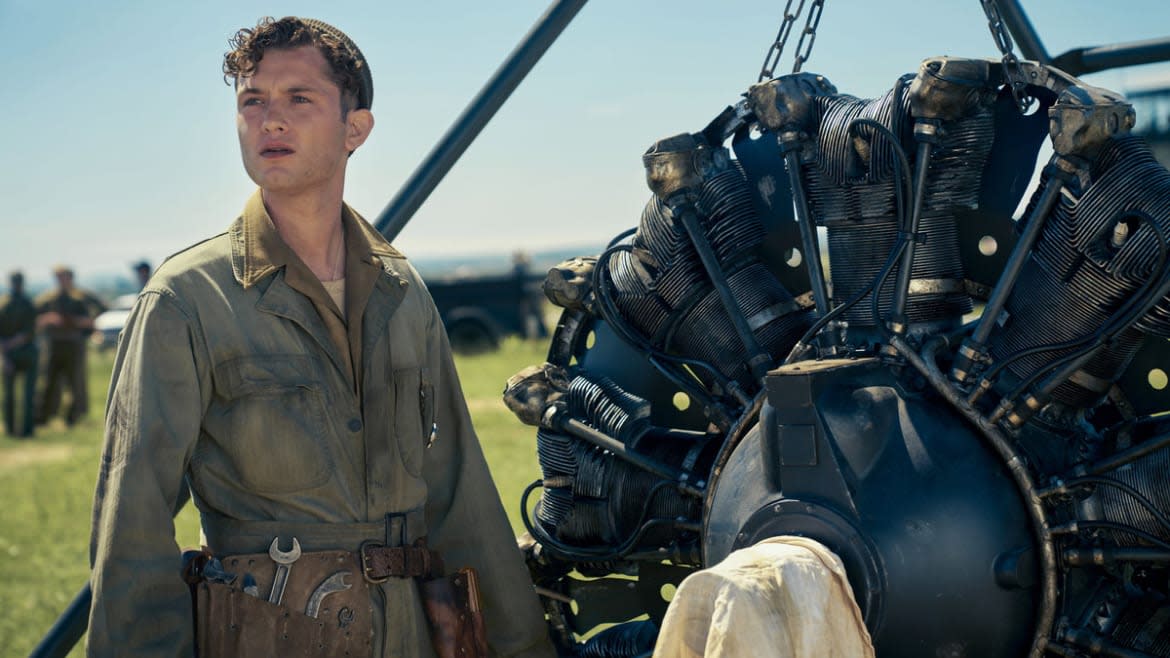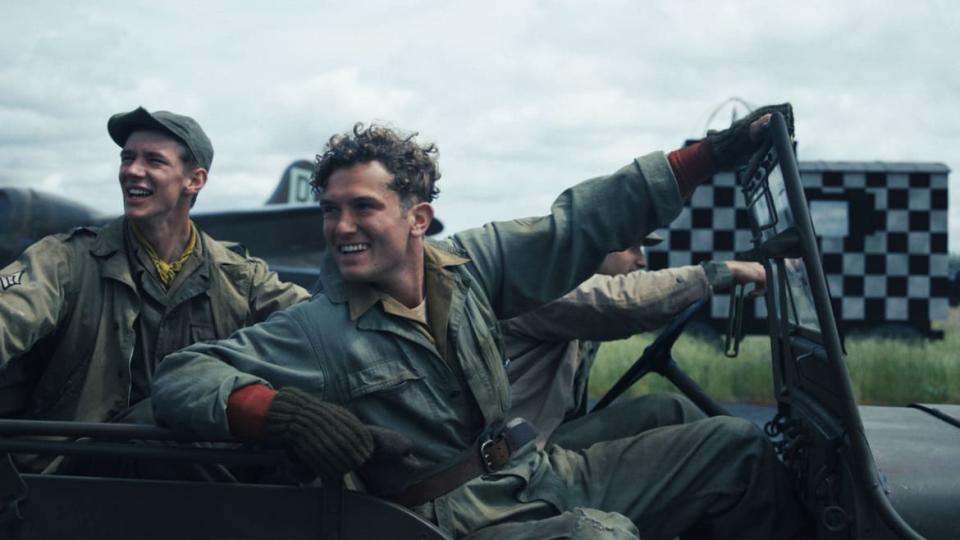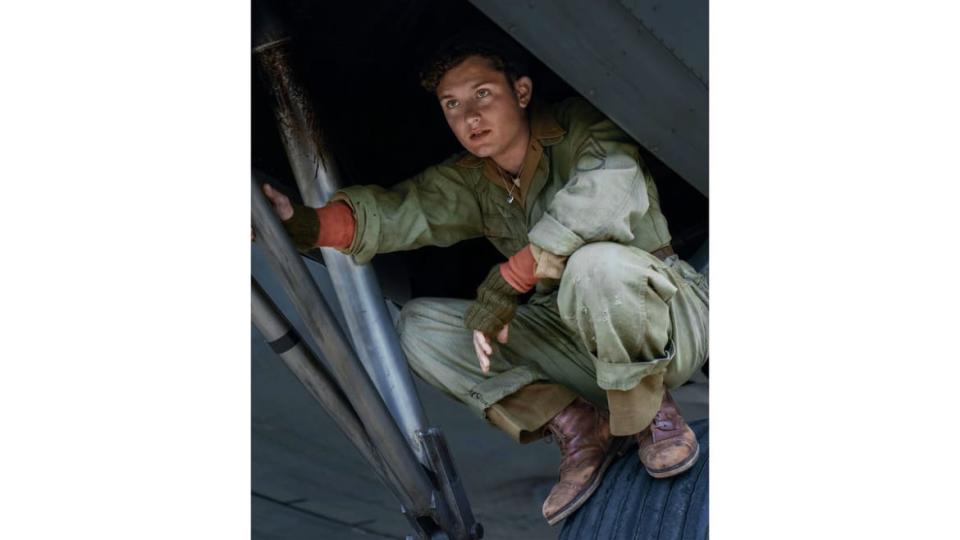Raff Law Breaks Down That Devastating Episode of ‘Masters of the Air’

(Warning: Spoilers ahead for the most recent episodes of Masters of the Air.)
Tension levels on a TV show with as many casualties as Masters of the Air is, unsurprisingly, sky-high, but some of the most suspenseful moments occur on the tarmac.
In the new Apple TV+ series, about the men fighting Hitler’s military forces in the skies over Europe, ground crew chief mechanic Sergeant Kenneth “Ken” Lemmons, played by Raff Law, already has his work cut out for him on a daily basis, as the B-17s that do make it back from combat 25,000 feet in the air are shredded by bullets, rockets, and flak. In Episode 4, Ken proves how invaluable he is, fixing an engine issue while it is taxiing down the runway, suspended in the wheel before leaping to safety before takeoff. It looks like something from Mission: Impossible, but it’s based on a real story Lemmons tells in his memoir, The Forgotten Man.
“There were a lot of different things that could go wrong; jumping out of the plane was one of them, onto concrete was another, and then the wheel behind,” Raff Law tells The Daily Beast’s Obsessed. “They were like, ‘It could possibly crush you if you don't move out of the way.’”
When you watch the scene, you can see that there are no clever cutaways where a stunt performer can be switched in for Law, or crash mats hidden off camera. “I was adamant that I was gonna do it all myself because I was like, ‘This is Ken Lemmons' big moment. I've got to do it,” says Law.
While Austin Butler, Barry Keoghan, and Callum Turner take to the air playing pilots in the Apple TV+ WWII epic from executive producers Steven Spielberg and Tom Hanks, Law is a reassuring presence back on earth. Like his fellow castmates, Law’s character is based on a real person from the Eighth Air Force in the 100th Air Group. The group is nicknamed the “Bloody Hundredth,” underscoring the high numbers of men who take off but haven’t returned—whether killed in combat, being held in a POW camp, or trying to find a way to safety via the underground resistance network.
By the fifth episode, Major Gale “Buck” Cleven (Butler) is MIA, Lieutenant Curtis “Curt” Biddick (Keoghan) has been killed in combat, and Major John “Bucky” Egan (Turner) just parachuted into enemy territory. Meanwhile, as one of five crew chiefs, 19-year-old Ken ensures the bombers are combat-ready, which is far from easy when only one B-17 makes it back—and that Flying Fortress is badly battle-damaged. “There are a lot of fatalities early doors, but it doesn’t hit you as hard until that moment [in Episode 5] when they look around, and there’s no one left in the sky, and there’s just the plane debris falling. [It] is really eerie,” says Law.
When Obsessed talks to the 27-year-old British actor, he is fresh off a 10-day press tour that has taken him from Los Angeles to London and back home to Tinseltown, where he relocated a year ago. It has been more than two decades since his father, Jude Law, worked with Spielberg on A.I. Artificial Intelligence, and there is an unmistakable father-son similarity: blonde curls, blue eyes, and infectious smiles. The UK premiere was a homecoming of sorts: “I got to have my grandparents there, my mum [Sadie Frost] came, my two brothers, my best friend, and being back in London with my family and having my grandparents there was the best thing.”
‘Masters of the Air’ Is Good Enough to Be the Next ‘Band of Brothers’
Speaking of family, he is now an honorary member of one; the LA premiere allowed Law to meet Ken’s relatives. “I had been in contact with them for a few years throughout filming, and they gave me a lot of insight into their father and support from the family,” says Law. After watching the first episode at the premiere, he met them, which felt like a full-circle moment for the actor: “To see how happy they are that their father's story gets to be told in this fashion.”
Here, Law talks about why showing the men who work back at the base is essential, the Masters of the Air boot camp experience, survivors' guilt, and more.
Keeping it grounded
“Quite quickly, I realized, in a lot of ways, Ken's story is the audience's eyes back at the base. You see the planes go, and you see them come back,” says Law. Ken also bridges another gap at the Thorpe Abbotts airfield, as local tweens gravitate toward the mechanic. It is easy to understand why, as he enlists their help in “fun little gimmicks,” like the fiery method of cleaning the hardstands and letting them sit in a cockpit, playing at being a pilot as Ken continues to work on engines.
Law mentions the age gap between the mechanic and the kids is less than 10 years, a sobering reminder of how young men in combat are. One invaluable resource for Law is The Forgotten Man, which gives insight into his round-the-clock work and the calming impact of these interactions with the community. For viewers, it “takes you away from all the tragedy, and it's a lovely moving narrative throughout.”
However, when events in this week’s episode take a catastrophic turn. The first time Ken snaps at the kids, it becomes clear that the planes are worryingly late. High losses from recent missions, including squadron leader Buck, have put a dark cloud over Thorpe Abbotts that quickly worsens. It is only Major Robert “Rosie” Rosenthal’s (Nate Mann) third time in combat, and he is already piloting a replacement B-17. No one could predict that only Rosie’s plane, Royal Flush, would survive the Münster mission, and there is no time to consider hurting these kids' feelings when circumstances are this fraught. “When he sees the one plane coming in, he kind of shouts at them for the first time. I think it shows how much these young guys were dealing with,” says Law.

Samuel Jordan and Rafferty Law
Wounded men are pulled off the plane on stretchers, and those who are physically uninjured are in various states of dazed and distressed. Ken has questions similar to those of the kids and inquires about the whereabouts of men like Bucky. Per protocol, Rosie can’t tell him anything until they have done the interrogation (aka the debrief). “Later, Kenny,” Rosie gently brushes him off. “That was an interesting scene for me because my initial reaction would be a bit more heightened emotion, but Ken looked up to the officers, and he stuck by ranks,” says Law. “I wanted to play with him, wanting to scream out and ask why, but also because he's not an officer, he couldn't act like that around them.”
Instead, a lot of quiet disbelief oscillates with wide-eye horror that the other planes have fallen. “It’s such a hard thing to get your head around, especially when these guys aren’t returning, and you're trying to figure out, ‘Are they dead? Are they not? Are they in a prisoner of war camp?” says Law.
The emotional cost
Survivor's guilt and PTSD ripple through the airbase, from the airman who says he isn’t going back up (“They can’t make me. I won’t do it”) to the ground crew who feels a sense of responsibility: “Of course, the people up in the planes seeing their mates get shot down, they're gonna go through all sorts of trauma. The guys who aren't [flying] are blaming themselves for different things back on the base they’re going through just as much in different ways.

Rafferty Law
Each plane holds a crew of 10 men, and charismatic leaders like Buck and Bucky raise squadron morale. In the fourth episode, Ken fixing Buck’s plane before a treacherous mission taps into this mentality. “They weren’t going to be able to fly that mission, and everyone looks up to Buck Cleven so much,” says Law. “I think not having him at the forefront, people's heads would go down, and you see that when he doesn't return.”
Whereas Keoghan’s exit from the series is unambiguous as we see Curt’s demise, the audience is equally in the dark about Buck’s fate as everyone back in England as this sky battle occurs offscreen. At this point in the series, we can't know what led to his plane going down, but Law says that “Ken kind of blames himself in a lot of ways” for this MIA status.
“That is another aspect of the ground crew that I wanted to get across, which was how they would hold that guilt when planes wouldn’t come back, and they blame themselves,” says Law. “There are so many different people and elements to this work; everyone is just as important to make the missions run.”
Get the Daily Beast's biggest scoops and scandals delivered right to your inbox. Sign up now.
Stay informed and gain unlimited access to the Daily Beast's unmatched reporting. Subscribe now.

 Yahoo News
Yahoo News 
